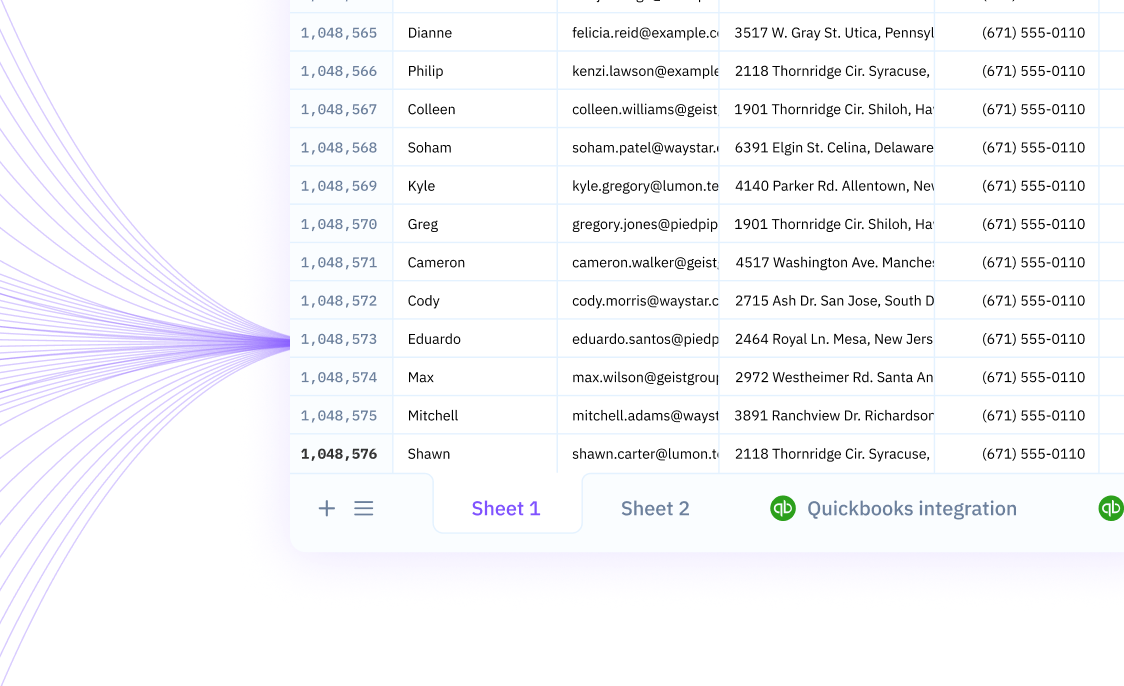
Export Metabase to CSV

Overview
Welcome to our comprehensive guide on exporting data from Metabase to CSV format. Metabase is a powerful tool for querying and visualizing data, but the real power comes from leveraging these insights outside the platform. Exporting to CSV allows for enhanced data manipulation and integration with spreadsheet applications, which is crucial for deeper analysis and reporting. On this page, we'll delve into what Metabase is, the simple steps to export your data to a CSV file, practical use cases for this functionality, and an exploration of Sourcetable as an alternative to CSV exports for Metabase. Additionally, we'll address common questions and provide expert guidance on exporting Metabase to CSV.
Exporting Data from Metabase to CSV
Using the Metabase Interface
To export data to CSV from Metabase, first navigate to the question or report you wish to export. Look for the download icon, which is typically located in the bottom-right menu of a question. Click on this icon and select 'CSV' from the dropdown menu that appears. The CSV file will then be generated and automatically downloaded to your local machine. It's important to note that the maximum size for a CSV export is 50MB, and users should be aware of potential issues with data types, timezones, special characters, and file encoding.
Automating CSV Exports
For those looking to automate the process of exporting CSV files from Metabase, the Metabase API can be utilized. This approach allows for scheduling and scripting the export process, enabling regular and systematic data extraction for consistent analysis or reporting.
Uploading CSV Files to Metabase
If you need to upload CSV files to Metabase for analysis, ensure that the Admin settings are configured to enable CSV uploads. This feature requires a writable database that supports PostgreSQL or MySQL. Additionally, users tasked with uploading need to be added to a group with unrestricted schema access. Metabase will attempt to detect primary keys for uploaded CSV files, but it is crucial to check for any special characters that may require escaping and to confirm that file encodings are correctly set to match the expected format using tools like iconv if necessary.
Streamline Your Data Management with Sourcetable
Unlock the full potential of your Metabase data by directly integrating it with Sourcetable, rather than the cumbersome process of exporting to CSV and then importing into another spreadsheet program. Sourcetable's ability to sync your live data from various apps or databases, including Metabase, ensures that you always have up-to-the-minute insights at your fingertips without any manual intervention.
Sourcetable simplifies complex data operations, enabling you to automate the import process and effortlessly query your data using a familiar spreadsheet interface. This not only saves valuable time but also increases the accuracy of your business intelligence efforts. Choose Sourcetable for a seamless, efficient, and dynamic data management experience.
Common Use Cases
-
Sharing and analyzing raw data with team members or external stakeholdersM
-
Performing data analysis using external tools that require CSV inputM
-
Archiving snapshots of data at a particular point in time for record-keepingM
-
Transferring data between different systems that support CSV formatsM
-
Creating reports or presentations that require data in a universally accessible formatM
Frequently Asked Questions
Why don't my CSV exports from Metabase include the visualizations?
CSV exports do not include visualizations because they are designed to provide raw data for sharing or further analysis.
What issues might I encounter when exporting data to CSV from Metabase?
You may encounter data loss or corruption if data types are not compatible, timezone discrepancies, incorrect formatting, and encoding problems.
What are the requirements for uploading a CSV to Metabase?
CSV uploads require Metabase to be connected to a writable database, users must have permission to access the schema where the CSV data will be stored, and the file size must not exceed 50MB.
How does Metabase handle CSV uploads with respect to database keys?
Metabase attempts to detect primary keys when you upload a CSV to ensure proper database integration.
Are there any specific settings I need to enable for MySQL when uploading a CSV to Metabase?
Yes, you must enable the 'local_infile' setting for MySQL to allow CSV uploads.
Conclusion
Exporting query results from Metabase to CSV is a straightforward process that provides users with the flexibility to share and analyze their data outside of the platform. By following best practices such as verifying data types, ensuring file encoding is UTF-8, and configuring CSV separators, you can maintain data integrity and avoid common pitfalls associated with data export. Keep in mind that while Metabase's CSV export functionality is powerful, it does not include visualizations and is subject to a 50 MB file size limit. For those looking to bypass these limitations and streamline their workflow, consider using Sourcetable to import data directly into a spreadsheet. Sign up for Sourcetable to get started and elevate your data analysis experience.


